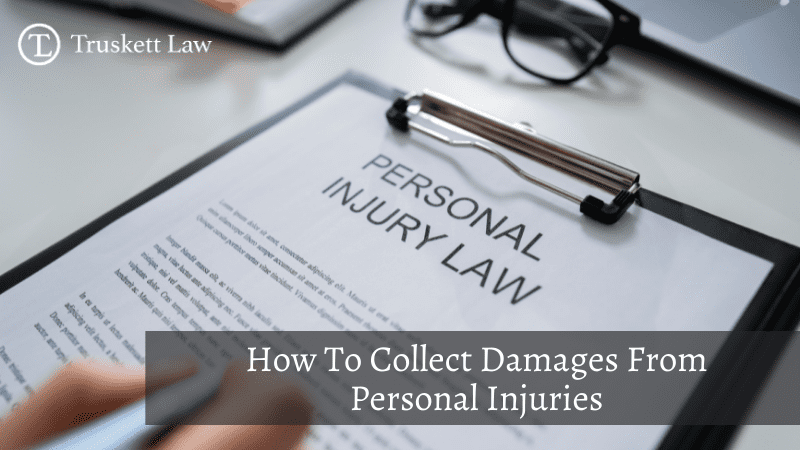
17 Dec How to Collect Damages from Personal Injuries
Collecting Damages from Personal Injuries
If you have been injured in any way, you may be able to collect damages from the person or company responsible. Damages can include medical expenses, pain and suffering, lost wages, and punitive damages (if the injury was intentional or caused by gross negligence).
So, how do you collect damages from a personal injury? To collect damages, you will need to file a personal injury lawsuit. The first step is to find a good personal injury lawyer. Personal injury lawyers typically work on a contingency basis, meaning they will not charge you any fees unless you win your case.
Keep reading to learn more about this important topic!
What Evidence Is Needed?
Your lawyer will help you gather evidence and build a case against the person or company responsible for your injuries. The process can take many months or even years. It’s important to retain a lawyer early in the process, as they will need time to build their case and locate critical evidence such as eyewitnesses.
Evidence That Supports Your Case:
- Photos of the scene (and injuries)
- Police reports and witness statements
- Medical records and bills
- Contracts and other important documents for evidentiary purposes (in case you need to sue an insurance company, for example)
- Emails and correspondence with the at-fault person or company
Your lawyer will want you to give a recorded statement about what happened. It’s very important that you tell them the whole truth in your statement.
It’s also important that you do not discuss the case with anyone but your lawyer. Other witnesses, the defendant, and their lawyers may be watching what you say. They can use anything you say against you to try to win their case.
Anything Else I Should Know?
 It’s very important that you do not sign any documents from the defendant or their insurance company without talking to your lawyer first.
It’s very important that you do not sign any documents from the defendant or their insurance company without talking to your lawyer first.
They may try to get you to sign a release of liability, which would waive your right to sue them in the future.
If you have been injured, do not hesitate to contact a personal injury lawyer. They can help you get the compensation you deserve.
What Is A Personal Injury?
Personal injuries are very common in the United States, with nearly two million personal injury cases reported each year.
Personal injuries can include car accidents, defective products, slip and falls, medical malpractice, legal malpractice, defamation (libel or slander), false imprisonment (imprisonment without sufficient cause), negligent security (failure to protect someone from imminent harm), and a variety of others.
What Is The Legal Process?
 First, you need to understand that your lawyer will be getting your compensation for you in most cases.
First, you need to understand that your lawyer will be getting your compensation for you in most cases.
You will likely not have to go to court unless the insurance company denies your claim or there is some other dispute.
The compensation that you receive will be in the form of a settlement, which your lawyer will negotiate on your behalf.
In order to maximize the number of damages that you will receive, you should provide your lawyer with as much information as possible.
This includes medical records, police reports, witness statements, and any other documentation related to the accident.
It is also important to be as honest as possible with your lawyer. If you have already been treated for injuries, tell your lawyer. If you have not seen a doctor yet, tell your lawyer that too. The more information your lawyer has, the better job they can do in negotiating with the insurance company.
Things to Keep in Mind:
- The more time that goes by, the less likely it is for you to get anything. Insurance companies are all too happy to sit back and wait until your case becomes stale.
- The more time that goes by, the less money you will receive. This is because your injuries are likely to become more serious over time.
- While it may be tempting to start using or spending your settlement before you receive it, don’t do it.
How Your Lawyer Can Maximize Your Settlement
 Do your best to get an early settlement. This means that they will try to get the insurance company to agree to pay before the case goes to court.
Do your best to get an early settlement. This means that they will try to get the insurance company to agree to pay before the case goes to court.- File a personal injury lawsuit. If the insurance company does not want to negotiate, your lawyer can file a lawsuit and take the case to court. This is often the last resort, but can sometimes result in larger settlements.
- Try to get the full amount of damages that you deserve. This may mean getting an expert witness, hiring an accident deconstructionist, or having your doctor write a letter describing the extent of your injuries and why they will not go away. All of this information can be used to maximize your chance at a successful settlement.
Hopefully, you will never have to go through the process of getting damages from a personal injury case. However, if you do find yourself in this situation, it is important to know what to expect. By understanding the process and working with a qualified lawyer, you can maximize your chances for a successful outcome.
What If The Insurance Company Denies My Claim?
In many cases, an insurance company’s original offer to settle a case will be below. This is why it is crucial to get the advice of a competent attorney who can help you determine if your case has value and what the insurance company should pay to compensate for your damages.
An experienced personal injury lawyer can evaluate your situation and help you decide if it makes sense to accept the offer, negotiate for more money, or go through litigation.
What Is The Use-It-Or-Lose-It Clause?
A “use it or lose it” provision in an insurance policy requires that you use any settlement money before your policy ends. For example, let’s say that you are in an accident and the insurance company pays you a $10,000 settlement.
If your policy has a use-it-or-lose-it clause, you must spend the entire $10,000 before the end of your policy. If you don’t, the insurance company will not have to pay you anything more.
This can be a serious issue, especially if your injuries require long-term treatment. Most policies have a use-it-or-lose-it clause for settlements, but not for judgments. Therefore, it is important to know what type of policy you have before you settle your case.
What Are Punitive Damages?
Punitive damages are damages that are awarded to punish the defendant for, especially egregious conduct. They are not meant to compensate the plaintiff for their injuries, but to punish the defendant and deter them from repeating the behavior.
Punitive damages are not common in personal injury cases, but they can be awarded in cases where the defendant’s actions were particularly reckless or malicious.
What Is a Statute Of Limitations?
A statute of limitations is a law that sets a time limit on how long a person has to file a lawsuit. In most states, the statute of limitations for personal injury cases is two years.
However, the time limit could be as short as one year. If you don’t file your case within the time period allowed under the statute of limitations, you will not be able to recover any money for your injuries.
If I Hire An Attorney, How Will The Fees Be Paid?
Most personal injury attorneys work on a contingency basis. This means that the lawyer will not get paid unless you win your case or settle out of court. If you do not recover any money, the lawyer will not receive a fee. Contingency fees usually range from 25% to 40% of the total recovery but can be higher or lower depending on the facts of the case.
Contact our team today to learn more about collecting damages from your personal injury case!


Sorry, the comment form is closed at this time.